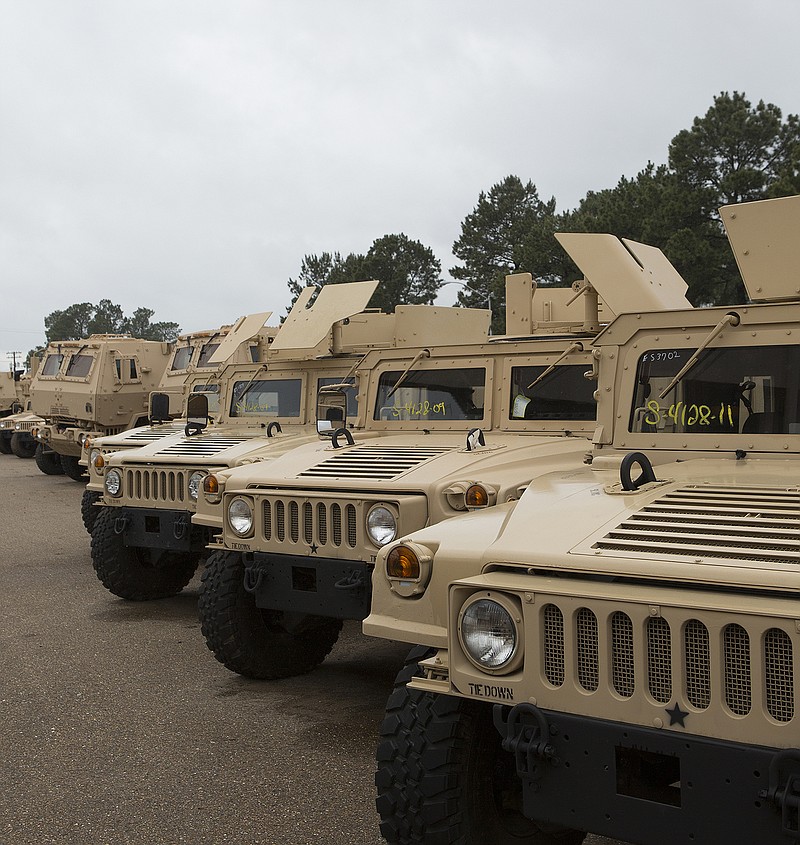Some officials in Congress are talking about another round of Base Realignment and Closure.
Rep. Adam Smith, D-Wash., ranking Democrat on the House Armed Services Committee, wants to introduce new legislation that would allow the Defense Department to conduct a new round of BRAC. The move has been rejected by Congress for the past several years, but may have support from the Senate this year.
Smith believes that realigning and closing bases is necessary to save more money, according to Associated Press reports.
Sen. John McCain, committee chairman, has said that allowing a commission to decide the bases' fates is "an act of cowardice" and that the BRAC commission made some "bad decisions." He has also said Congress must act to rebuild the "decimated" U.S. military.
However, McCain agreed Tuesday that lawmakers "ought to give (another round of BRAC) serious consideration."
Red River Army Depot has survived being on a base closure list twice during the BRAC process. Dennis Lewis of the Texas Military Preparedness Commission is a longtime advocate for RRAD and contends the base's tenacity is not a coincidence.
"Red River Army Depot has been closely examined during the previous BRAC processes," Lewis said. "Officials have come away impressed not only with the job the base does, but her ability to absorb increased demands in times of national need."
Despite drawdown in some capacities in defense infrastructure, military logistics was able to keep pace with mission demands during the wars in Iraq and Afghanistan. Lewis credits RRAD and its expansive capacity to increase its workload and support operational surge.
"RRAD is the right size with available capacity to absorb surge and meet national defense requirements," he said.
When it comes to the BRAC process, only base capacity is being considered, Lewis clarified. "BRAC isn't about troop numbers or numbers of various pieces of equipment, vehicles or weapons-that's another issue considered by a different process. BRAC only concerns itself with base capacity. Do we have what we need to meet current mission and, ideally, do we have capacity to take on expanding mission in times of crisis or emergency?"
So when the BRAC process takes place, the commission has to consider whether excess capacity is a necessary redundancy to handle increased needs of the military. Is a given base really necessary, or can its operations be reduced or combined into fewer bases?
"Can base A absorb base B or can those be combined? Or are the missions in question so unique to make relocation impractical?" said Jerry Sparks, economic developer for the city of Texarkana, Texas.
The main reason for BRAC is saving national defense dollars. Lewis pointed out that in previous rounds of closures, those savings have not been as clear-cut or quickly realized as some hoped.
"Shutting down a base actually is an expensive process," Lewis said. "You have to reassign that base's mission elsewhere. Then, you have to go through the process of preparing that property to be shut down, including cleaning up any messes that may exist on it. Yes, savings can be had, but it isn't the windfall some may say it is."
Even when a base is shut down, it may remain deserted, rather than repurposed.
"It is all about location," Sparks said.
Several variables have to be considered, but it boils down to capacity.
"Do we have too much capacity, or too little? And in the right places?"
"Politics also figures into this," he said. "Some of the officials may tell you this is all math and formulas, but it isn't. Politics and relationships figure into this. If you have a solid relationship with officials involved in this process, you have a better chance of your case being viewed favorably."
But whether RRAD will be subject to another review is up in the air.
"We are dealing with a lot of unknowns right now. How all this is going to come down is anyone's guess," Sparks said.
Lewis said the strong community support is what makes the depot's case.
"RRAD has always had strong relationships with the local community," Lewis said. "During the previous BRAC's, not only did local officials show up to advocate for this post, so do families, local business owners and so forth. The community support and love for that base was so strong, it could not help but sell the case of RRAD to the decision makers."
Since then, The depot has teamed up with local educational institutions to train skilled professionals to fill the workforce needs of the base and of other local industries.
"We have also improved the infrastructure that serves the base, with I-30 now coming right into the base to make logistics easier," Lewis said. "Also, the water system is now tied directly with that of Texarkana, Texas, and now has more than enough to meet operational needs."
New Boston, Hooks and Maud, Texas, and other local communities are tied to and work with RRAD.
All this means a far stronger base and supporting community, should another BRAC come around. Whether that will happen, no one is sure.
"Does another BRAC concern us?" Lewis asked. "Yes, it does. And I do believe, sooner or later, another one is going to happen. But we are doing what we need to do to fight for RRAD. We are staying alert. We are pushing what we offer to increase our value. We are keeping our ears to the ground. We cannot be complacent-not with the status quo. We have to be ready for the fight."
The Associated Press contributed to this report.

